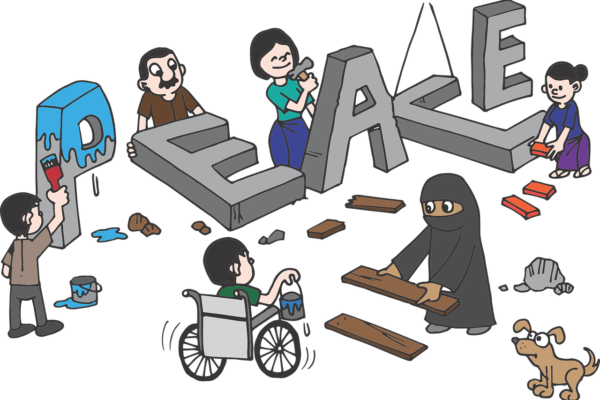“There are a lot of organizations to help with that” a friend might say if you mention a problem you’re experiencing related to your disabled child. Maybe the school isn’t providing the services they they should. A doctor’s office won’t make reasonable accommodations to allow your child to receive the care that they need. Your child needs a service or a piece of equipment to help them with the effects of their disability. You know there’s a program for that, right?
From the way it’s described, you just sign up for this helpful program and they put everything in place to deliver what your child needs so you don’t have to worry about a thing. Easy peasy lemon squeezy. There’s two problems with this. 1: The implication that parents shouldn’t complain because taking care of a disabled child is a piece of cake or we don’t need supports from friends and neighbors because there’s all these helpful support services available. Sometimes parents of typical kids, completely oblivious to all of the extra work involved which these programs are a (misguided) attempt to mitigate, are even jealous of the supports – “I wish *I* had XYZ to help me with my kid.” Oof. No you don’t wish you had to deal with this. Not my child – my child is delightful. And when she isn’t, she’s struggling and deserves help rather than condemnation. But the nightmare of dealing with the disability system, which is anything but delightful. And that brings me to problem number 2: The ridiculous amount of work that it takes to be able to access the “supports” – often more work than it would have been if you just did it by yourself in the first place.
We’re talking about waiting lists (it seems 1-2 years is the standard, kinda like when you order Chinese food and the person parrots back “10-15 minutes” as the standard reply), unfair eligibility criteria that often have the effect of ensuring the most disabled people can’t use a service that has been specifically designed for them (“we’re sorry, if you cancel more than one session we can no longer provide occupational therapy”), the compounded effect of being a parent with a disability parenting a child with a disability that no one ever considers (we can accommodate you or your child – pick one) and perhaps the most pervasive anti-support – undelivered promises. The organization that shuffles you through what seems like an endless series of intakes and assessments and reassessments, answers emails and calls occasionally, but never really delivers the service that they said they would.
And when you get up the courage to ask “Hey, it’s a lot of work to participate in this program – when exactly are we gonna get to the good part where my child actually gets something out of it?!” you’re either met with excuses that don’t make sense – “We’re out of the office after lunch today for a training.” Or “I’m sorry for the delay – I was sick last Wednesday.” Okay? So is my child who you’re supposed to be helping. Have we forgotten about her being sick? If you’re talking about why no progress has been made in months or years, that makes no more sense than “I have a hole in my underwear and my dog ate the paperwork.” You might as well say “I couldn’t help you because the sky is blue today.” Or if you don’t get excuses, you’re met with admonishment because clearly you’re the one to blame for having such high expectations:
Everyone is working so hard for your kid, it only took them a year to get you eligible for this other program which has 17 steps and you’re already halfway through the second step which is great for only being 3 years into the process so of course you’re being helped and how dare you complain – you should sit down and be quiet and be thankful. There’s lots of other kids who aren’t disabled enough to get into this who would love to take your place. Oh and it’s also time to sign up for the next monthly meeting – I hope Tuesday at 8:15 am works because that’s the last time we have available since we waited until the last few days of the month to even ask. If you can’t make the meeting Tuesday that we all agreed on (huh?) then you’ll be out of compliance with the program and we’re gonna have to send a letter threatening to remove you and you’ll have to start this process over if you can’t meet our basic minimum standards of participation. These meetings are a required component of the program.
“Dedicated” Care Managers Everywhere
Nevermind that you have another more important appointment or your child was up all night jumping on the bed despite your best efforts to put them to sleep and you maybe actually wanted to do something crazy like…I don’t know… get a couple hours of sleep yourself while they sleep. UGH! It’s enough to make you tear your hair out sometimes, isn’t it?! There’s also the program that never was the right fit for your child, but you spent a ton of time working on getting them into because you’re given the wrong information by people who are running the program who are supposed to be the experts. Months or years later you realize it’s all wasted effort because the program doesn’t actually provide what you think it does, or your child was never even eligible in the first place. And lastly, there’s the chain reaction. You finally find a program that addresses your exact concern, but you’re told they aren’t accepting people on the waiting list right now, so they suggest you contact another program which is actually a much better fit anyway, and you contact them, but they suggest something else would be more appropriate, and so on. It’s like being on a wobbly ladder – if there’s just one missing rung, you can still make it up, but if all the supports that you need are missing, you’re stuck holding two useless boards that won’t help you get anywhere. You almost want to call your friend back and say “so much for ‘there’s a program for that!'”
This is post one in a two part series: Anti-Supports: Help that Isn’t Helpful and Anti-Supports: Help that Isn’t Helpful Part II.





